Covid: 'Don't blow it' says health secretary as thousands gather in sunshine
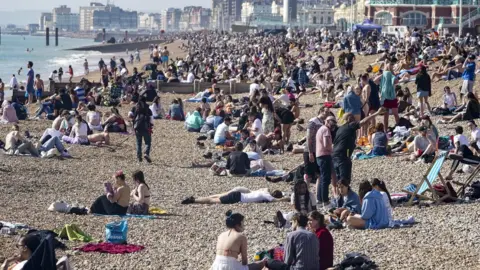 Getty Images
Getty ImagesAs the UK enjoyed the hottest March day in half a century, thousands gathered to enjoy the weather in outdoor spaces, prompting social distancing concerns.
Parks in Birmingham and Leeds as well as Brighton beach were busy on Tuesday evening. Two parks in Nottingham are now shut after "frightening" scenes.
Heath Secretary Matt Hancock tweeted to say "don't blow it" - urging people to enjoy the warm weather safely.
A Birmingham resident said scenes at a city park "looked like a festival".
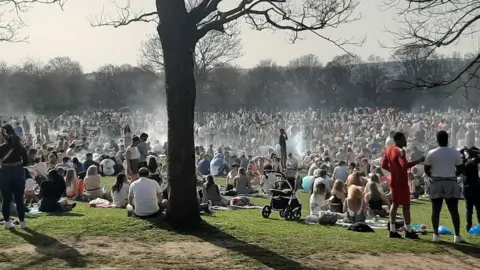 Yorkshire Live
Yorkshire Live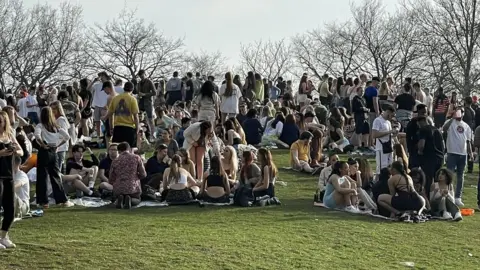
"When I see the pictures I do get anxious," Prof Sian Griffiths, a senior public health official, told BBC Radio 5 Live.
"If we're not in a household bubble we need to be two metres apart and I don't think those pictures look like that's happening."
Nottingham City Council leader David Mellen branded the scenes in Nottingham on Monday as "frightening" and has now closed two of the city's parks in response.
"We regret having to take this action, since everyone has been looking forward to the chance to visit our parks, now that easing of restrictions means we can meet up to six other people outdoors," he said.
"Sadly, the actions of a thoughtless minority has spoilt that. We will keep the situation under review and hope to reopen parks as soon as possible."
Allow X content?
In Birmingham, thousands gathered at Holders Lane playing fields, in Moseley, with taxis doing multiple drop-offs from about 20:00 BST.
The BBC understands a party had been arranged earlier in the day via social media and at the time there was no police presence.
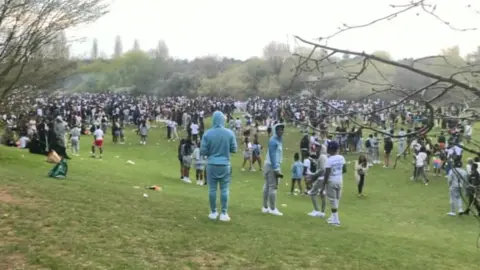
Flyers were also shared on social media regarding another gathering for students in the city's Cannon Hill Park, which is linked to the playing fields. West Midlands Police said officers had been sent there but "did not need to issue any fines".
"Officers initially found no breaches of coronavirus legislation, with people enjoying the weather in small, individual groups," Supt Farooq Sheikh said.
"The crowds were good-natured and engaged with officers and the park was all clear by 23:30."
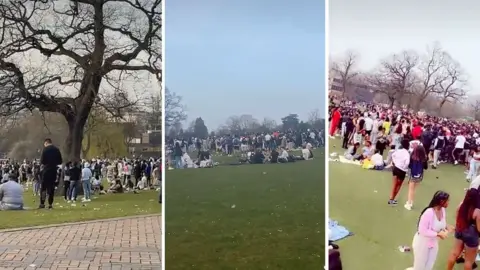 SNAP
SNAPHowever Adam Jones, who lives nearby, said the park "looked like a festival" on Tuesday evening.
"While there were a fair few people in small groups respecting distancing, they were overshadowed by lots of big groups, sometimes up to 20 to 25 people, blaring music," the 27-year-old said.
Thousands of revellers on Brighton beach danced into the night as fire performers drew large crowds as the sun went down. Some were photographed flouting the rule of six and social distancing guidelines.
Merseyside Police made the decision to impose a dispersal order on Formby beach following reports of anti-social behaviour.
The force said it was in response to "youths gathering on the beach and dunes" and would remain in place until 19:00 on Thursday.
Allow X content?
Essex Police also enforced a dispersal order in Leigh-on-Sea after reports of a large group of people congregating at a seafront and behaving anti-socially.
Meanwhile in Newquay, Cornwall, more than 100 people were found gathering and setting fires in protected sand dunes.
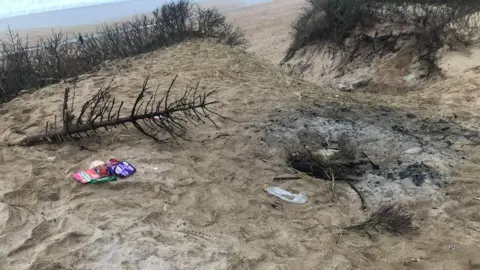 Friends of Fistral Dunes
Friends of Fistral DunesNewquay Community Fire Station was called overnight to dunes by Fistral beach twice this week.
Multiple groups were found burning rubbish and a skip was on fire because of "inappropriately" discarded disposable barbecues, the station said.
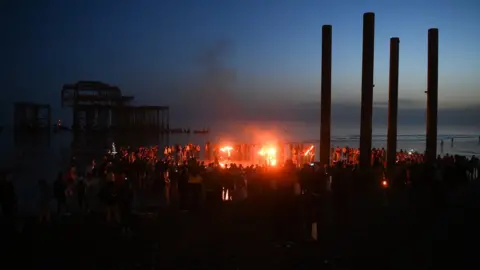 Getty Images
Getty ImagesLast summer when thousands flocked to Bournemouth beach, in Dorset, for one of 2020's warmest weekends, a spike in the number of coronavirus cases was predicted but never materialised.
Evidence suggested crowds on the beach did not significantly spread the virus. However, Prof Griffiths said there was still a risk and people should not be complacent.
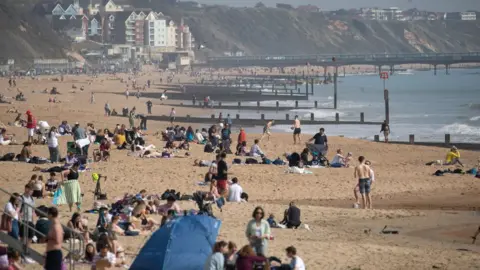 PA Media
PA Media"If you were carrying one of the variants we'd see a different picture," she said. "This is all about reducing risk - yes the risk of passing the disease on outside is much lower than if you're inside, but it's still there."

Analysis
By Dr David Gregory-Kumar, BBC Midlands Today science correspondent
If you've been obeying the rules then pictures of people out partying in a local park probably rub you up the wrong way. Plenty of people are ready to blame thoughtless behaviour, particularly by the young, for any rise in infection rates.
The scientific truth though is that a gathering outdoors is very low risk. Scenes of Britons heading to beaches or to hills as lockdowns were lifted in the past have not been followed by more people ending up in local hospitals. Outdoors, the airborne coronavirus quickly blows away and so the danger of infection is small.
While what happened yesterday in our parks is against the rules, it likely won't cause problems long term, at least as far as Covid is concerned.
It's worth contrasting these outdoor parties with events like Cheltenham Races in 2020. Cheltenham may have been an outdoors event but it also went hand in hand with packed public transport, bars and pubs. Now that was an event that many suspect did cause infection rates to increase.

Since Monday, two households or groups of up to six people have been able to meet outside in England as the stay-at-home Covid restrictions order came to an end.
"Despite today's easements," Prime Minister Boris Johnson said at the time, "everyone must continue to stick to the rules."
The government also unveiled a new slogan - Hands, Face, Space and Fresh Air - to emphasise the importance of ventilation in reducing the spread of the virus.
"It's your behaviours while you're [outside]," Prof Griffiths said. "We just have to think about the risk of the virus and adapt our behaviours."
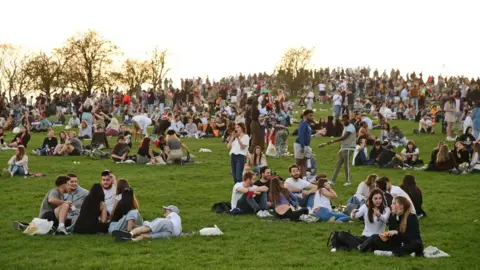 PA Media
PA MediaOne of the other concerns to follow the gatherings was the "masses" of litter left behind in parks.
Rebecca Langton, a Nottingham City councillor, said rubbish left behind in the city's outdoor spaces was "really disappointing".
"We've spent a good couple of hours this morning cleaning up masses and masses of litter," she said.
"We want people to get out and enjoy the parks but it's just about people being responsible."
The BBC's Tom Airey was at Woodhouse Moor, in Leeds, as the aftermath of Tuesday's crowds was laid bare and said there was "a sea of rubbish stretching across the park's gentle slopes".
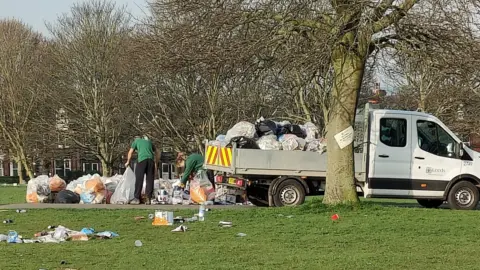
The first Leeds City Council workers to arrive had already filled four hay bale-sized bags of litter by 10:00, collecting glass beer bottles, crisp packets, discarded bags-for-life, used disposable barbecues and nitrous oxide canisters. This was all despite multiple 'no litter' signs along the park's tree-lined paths.
"It's really disgusting that people left their litter piled up by the bins and across the grass, and it's an issue that happens every time there's a hot day in Leeds," 26-year-old student Sophie Meredith said.
"Today was the worst I've ever seen it, and it's probably made worse by the fact that everyone's been cooped up for a year."
Similar scenes have been reported across England in places including Sheffield, Doncaster and Bristol.
Allow X content?
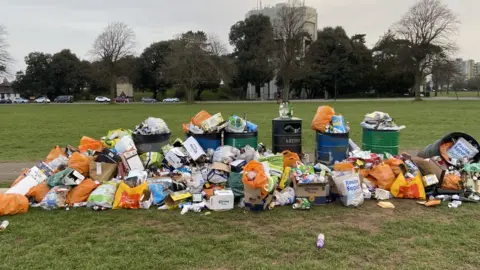 Tim Dowling
Tim DowlingIn Sheffield, the council started a litter-picking operation early in the morning and shared images of rubbish strewn across Endcliffe Park.
"[Maintenance workers] have been out since 06:00 clearing up but our resources could be much better spent," the local authority said on Twitter. "Don't leave your mess, please love our parks."
The waste left behind at Birmingham's parks also meant the city council there had to suspend planned grass-cutting so workers could focus on removing litter.
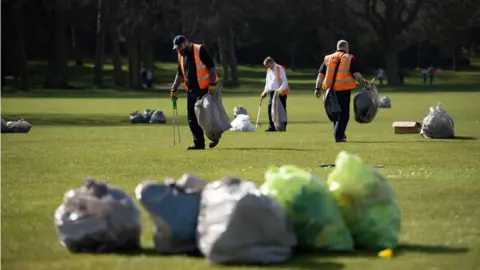 PA Media
PA MediaKeep Britain Tidy said the litter was a "disaster for our environment" and urged people to "take some responsibility and dispose of their rubbish correctly".
"While it is great that people can now come together in our parks and on our beaches after a long, hard winter, we need them to do the right thing," Richard McIlwain, from the charity, said.
"Particularly when it comes to disposing of their rubbish."
